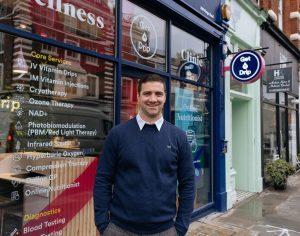Trust is an essential ingredient in entrepreneurial circles; if you don’t know who you’re working with or investing in, you will be exposing yourself to unnecessary risk. When carrying out this kind of due diligence, background checks will be a key part of an entrepreneur’s armoury and yet they have failed to keep a pace with the world of modern business. Waiting weeks and weeks to find out if your potential new director passes muster is a hold-up no startup can bear. Fortunately, new player Onfido uses automation to cut the time and capital businesses must invest in running background checks.
Like all truly great startups, the idea for Onfido was born from personal experience. Co-founders Eamon Jubbawy, Ruhul Amin and Husayn Kassai met whilst attending the University of Oxford. It was when Jubbawy and Kassai, both studying economics and management, started summer internships at Credit Suisse and Merrill Lynch respectively that they learnt how drawn out the existing process was. “We were background checked and we started an excessively paper-based and cumbersome process that took two to six weeks,” says Kassai. “You hardly ever need to print out forms and write your name out anymore so this wasn’t an industry that seemed to be part of the 21st century.”
On their return to university, the future Onfido founders had an opportunity to find out just how many institutions were struggling with protracted and costly background-checking processes. At the time, Jubbawy and Kassai acted as vice-president and president of the student entrepreneurship society Oxford Entrepreneurs and they had to tour a range of organisations such as banks, consulting firms and SMEs to raise sponsorship for the organisation. “After the sponsorship conversation, we thought we’d ask: ‘how do you currently carry out background checks?’” says Kassai. “The recurring themes and pain points were always exactly the same: turnaround times, cost and the quality of the checks.”
This led the founders to consider how they might be able to improve things and the answer was pretty clear. “About 80 – 90% of the traditional background checking processes are manual,” Kassai says. “The vast majority of this stuff can be automated.” Currently background checks tend to be handled by data processors; they manually enter applicants’ data from forms and push key info to certain data suppliers, before chasing and collating responses into a complete pack.
There are obviously several clear problems with this. First of all, employing data processors significantly raises the costs of carrying out background checks. Another problem is there is a higher risk of error than with an automated process. “Having to type something two or three times, where you naturally have human-based risks, makes the process much more error prone,” says Kassai. Finally, this method is also far more time-consuming, severely delaying responses and meaning customers can’t see the results until a full report has been compiled.
Onfido realised the huge value that could be created by streamlining and automating this process. “Through live feeds we’ve integrated with all the data suppliers,” Kassai explains. “The applicant provides all of the information and we automatically trigger the process.” As the startup’s service connects digitally with the various agencies and stakeholders, this enables them to serve results direct to customers as soon as they are processed. “We present them to the customer live, so they can see instantly once an identity has been verified or a right to work has been confirmed,” continues Kassai.
And it wasn’t too difficult for the young startup to get off the ground; not only did it secure some seed capital from the University of Oxford but it had a ready-made customer base pretty much off the bat. “Our first customers were the Oxford Entrepreneur sponsors,” says Kassai. The co-founders returned to the institutions and SMEs they had visited and told them they had created a service that dealt with the pain points they had helped identify. This has certainly stood the startup in good stead. “From the early days, we were able to show good traction because we had customers who paid for and valued the service,” he says.
Very quickly the startup found there was huge demand for its service. “It’s good timing,” Kassai says. “Be it a growing migrant workforce, increasing legislation or the expanding jobs market, background checks are becoming a lot more common.” Onfido also found that there was a natural opportunity for its service to support a range of non-traditional industries. “We are increasingly becoming part of the backbone of the sharing economy,” he says. “Trust is such a core element; you can’t have a stranger coming and being a tutor to your child, sharing a car with you or cleaning your home if you can’t trust them.”
But this isn’t saying the whole journey has been a cakewalk; dealing with this kind of data obviously requires a lot of checks and balances. “You’ve got to be registered with the data commissioner and there are licenses to be had from the data suppliers,” says Kassai. “You also have to show you’re credible; you have to have a very secure premises and cloud servers.” Onfido is obviously required to go through significant due diligence processes with customers, particularly large institutions like banks. But partly he feels this is just the cost of blazing a trail; as Onfido forms more established relationships with certain sectors and organisations, this becomes significantly easier. “When you’ve done it for a highly sensitive industry or customer once, then they become significantly more comfortable with it.”
A lot of thought has gone into creating Onfido’s pricing model, reflecting the requirements of its customers. “SMEs, on-demand services and shared economy startups are not in a position to plan over the next 12 months how many people they’re going to hire,” Kassai says. Whilst many background-checking services rely on lengthy, high-volume contracts, Onfido has focused on creating a much more granular payment structure. “We’ve made it quite flexible,” he continues. “As and when they want to, businesses can come online, pay for a specific check, use it and then come back later.”
And this plug-and-play approach isn’t limited just to the checkout. “As an SME, one day you’re just hiring a junior level associate, the next a potential manager,” Kassai says. Onfido provides a broad range of checks from basic identity or right to work checks up to negative media and directorship checks, meaning customers can select the checks that suit the roles they are hiring for. “Depending on the risk profile and the importance of that role, you can pick and choose the core checks, whereas for more senior roles you can opt for the works,” he says.
These factors have definitely proven to be a hit with customers. And, within certain industries, the word of mouth this has generated has allowed Onfido to scale up very rapidly. “The sharing economy is a small community, they’re all tech-driven and they all learn from each other,” Kassai explains. “They typically put our logo on their website to deter risky applicants and signal credibility to their customer base.” And even in more traditional sectors like banking, the nature of Onfido’s work means it often comes into contact with established players. “When we do checks, we interact with other companies to verify other information,” he says. “We’ve had quite good exposure and uptake on that front too.”
The startup also has some seriously heavy artillery in its arsenal in terms of advisors and investors. Not only does it have backers who have been directors at big corporates like Google UK and Waterstone’s but it also has the support of entrepreneurial royalty such as Brent Hoberman, co-founder of Lastminute.com, and Greg Marsh, co-founder of Onefinestay. “It’s just terrific having these high-profile individuals as investors, giving endorsements, referrals or advice,” says Kassai. “And we’ve got quite a few very senior advisors from the background-checking industry.”
With this kind of fuel in its engines, it seems likely that Onfido will go far but Kassai has no illusions he and his co-founders can afford to rest on their laurels. “We have so many plans and so many things to do,” he says. Not only is the startup planning to add additional products but it is also looking at expanding its geographical reach from 28 countries to a target of 35 by the end of this year. So, all in all, you can take it on trust: Onfido’s stock is only set to rise from here. ![]()
Share via:


















































